Barton ministry facts for kids
Quick facts for kids Barton ministry |
|
|---|---|
1st Ministry of Australia |
|

Governor-General Lord Hopetoun with first arrangement of newly appointed ministers to the Barton ministry on 1 January 1901. Sir James Dickson (fifth standing to the left) would be dead nine days later.
|
|
| Date formed | 1 January 1901 |
| Date dissolved | 24 September 1903 |
| People and organisations | |
| Monarch | Victoria Edward VII |
| Governor-General | Lord Hopetoun Lord Tennyson |
| Prime Minister | Sir Edmund Barton |
| No. of ministers | 11 |
| Member party | Protectionist |
| Status in legislature | Minority government (Labour support) |
| Opposition party | Free Trade |
| Opposition leader | George Reid |
| History | |
| Election(s) | 29–30 March 1901 |
| Legislature term(s) | 1st |
| Successor | First Deakin ministry |
The Barton ministry was the very first government of Australia. It was led by Sir Edmund Barton, who became Australia's first Prime Minister. This important group of leaders started their work on 1 January 1901. This was the day Federation happened, when Australia's separate colonies joined together to form one nation.
The Barton ministry was part of the Protectionist Party. They were in power until 24 September 1903. At that time, Sir Edmund Barton left politics to join the new High Court. The government was then taken over by the First Deakin ministry.
James Drake was the last person from the Barton ministry to pass away, in 1941. He was also the last surviving minister from two later governments. Elliot Lewis was the last surviving member of the original group of ministers chosen by Barton.

Contents
Australia's First Government
This section explains how Australia's first national government was formed. It also covers the main jobs and people in charge.
Forming the Government
When Australia became a nation in 1901, it needed a government. Sir Edmund Barton was chosen to lead this first team of ministers. These ministers were like a team of leaders who helped the Prime Minister run the country. They were responsible for different areas, like money, defence, and foreign affairs.
Key Roles in the Ministry
The Barton ministry had several important roles. Each minister was in charge of a specific area. Here are some of the main jobs:
Prime Minister and External Affairs
- Sir Edmund Barton was the Prime Minister. He was the overall leader of the country. He was also the Minister for External Affairs, meaning he handled Australia's relationships with other countries.
Attorney-General
- Alfred Deakin was the Attorney-General. This role is like the chief lawyer for the government. They give legal advice and help make sure laws are fair.
Treasurer
- Sir George Turner was the Treasurer. This minister is in charge of the country's money, including taxes and spending.
Defence and Postmaster-General
- Sir John Forrest held several important roles. He was the Postmaster-General, looking after mail and communications. He also became the Minister for Defence, responsible for Australia's military.
Trade and Customs
- Charles Kingston was the Minister for Trade and Customs. This job involved managing trade rules and collecting taxes on goods coming into the country.
Other Important Ministers
- Sir William Lyne was the Minister for Home Affairs. This role dealt with things like elections and public works within Australia.
- Richard O'Connor was the Vice-President of the Executive Council. He also led the government's work in the Senate.
- James Drake and Sir Philip Fysh also held important positions, helping with various government tasks.
The Barton ministry laid the groundwork for how Australia would be governed. They made many important decisions that shaped the new nation.
Images for kids
 | William M. Jackson |
 | Juan E. Gilbert |
 | Neil deGrasse Tyson |












